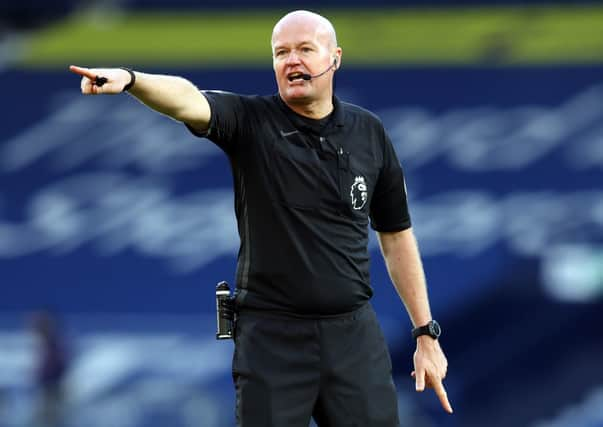Why it’s time to give referees the chance to explain their decisions - Sue Smith on Football


If they came out after a game and gave a reason, a summary or an explanation of why they made the big decisions they did, I hope that would instantly put a lot of controversy to bed.
Had Lee Mason come out after last week’s West Bromwich Albion versus Brighton and Hove Albion game and said he was really sorry but he made a mistake over Lewis Dunk’s disallowed goal, people would still be annoyed, but I would like to think Brighton fans and Dunk himself would be a bit more understanding.
Advertisement
Hide AdAdvertisement
Hide AdBy not being allowed to say anything, it just rumbled on and on.
Referees are on the pitch and in the know, so they can help those of us watching to understand a bit better.
Some of my friends disagree and there will still be idiots who refuse to listen, but I would like to think there are also lots of well-rounded fans who will understand if an official admits they made a mistake, like we all do in our jobs.
There has been a lot of focus this season on the number of matches players are playing, but it applies to referees, too, who also act as fourth officials and video assistant referees.
Advertisement
Hide AdAdvertisement
Hide AdIn my playing days we used to sometimes do training drills when fatigued because it can really affect your decision-making and in the same way it can lead to an own goal or a bad tackle, it must be a factor in some bad refereeing decisions.
It should be up to a referee to speak to the media if they want to, and it is wrong of the Professional Game Match Officials Board to stop them.
Even if they did not speak immediately after the game when people are 10 times more emotional but the next day, that would be helpful.
When a player makes a costly mistake in a game, the first thing they usually do when they get into the dressing room is apologise to their team-mates and manager.
Advertisement
Hide AdAdvertisement
Hide AdI remember playing for Tranmere Rovers against Charlton Athletic when they were top of the league. We were 3-2 up when Charlton won a late corner. Normally I would stay upfield because I was not great at defensive set-pieces but I thought I would come back to help as it was the last kick of the game. The ball was whipped in and pinged off my 50p head into our net.
I was really apologetic in the dressing room afterwards but my manager straight away pointed out I had saved the team numerous times last season. If there has been 30,000 fans watching I would have wanted to apologise to them, too.
It would help stop the anger if those players fronted up in the media afterwards but whether it is the club’s press officer blocking it or their own reluctance we rarely hear it.
When nothing is said by referees, we make assumptions. Mine is that Mason panicked after blowing his whistle to let Dunk take a quick free-kick, and blew it again when he saw Sam Johnstone out of position lining up his wall.
Advertisement
Hide AdAdvertisement
Hide AdAfter Sunday’s Chelsea versus Manchester United match where Stuart Attwell controversially decided not to award a penalty against Callum Hudson-Odoi, Luke Shaw told Sky the referee said he could not give it because “it would cause a lot of talk after”, something his club claimed the following day he had “misheard”. Attwell was unable to defend himself.
The referee might be at home watching a player or manager’s post-match interview wishing he could put what they said into its proper context.
Even with all the cameras in grounds, they still see incidents from different angles.
Where I would stop short is in letting television viewers hear the referees during the game as in rugby.
Advertisement
Hide AdAdvertisement
Hide AdI am not defending it, but the reason is the football language they constantly get subjected to, something you do not hear much in rugby and something, incidentally, I did not really hear when I was a Leeds United player who regularly watched the boys’ Under-18s.
Referees used to tell us we could swear so long as we did not swear at them.
I would like them to turn the microphones off during play but let us hear conversations with the VAR in Stockley Park to explain why those decisions are given.
Hearing the human side of referees might make us all a bit more understanding.
Advertisement
Hide AdAdvertisement
Hide AdSupport The Yorkshire Post and become a subscriber today. Your subscription will help us to continue to bring quality news to the people of Yorkshire. In return, you’ll see fewer ads on site, get free access to our app and receive exclusive members-only offers. Click HERE to subscribe.
Comment Guidelines
National World encourages reader discussion on our stories. User feedback, insights and back-and-forth exchanges add a rich layer of context to reporting. Please review our Community Guidelines before commenting.